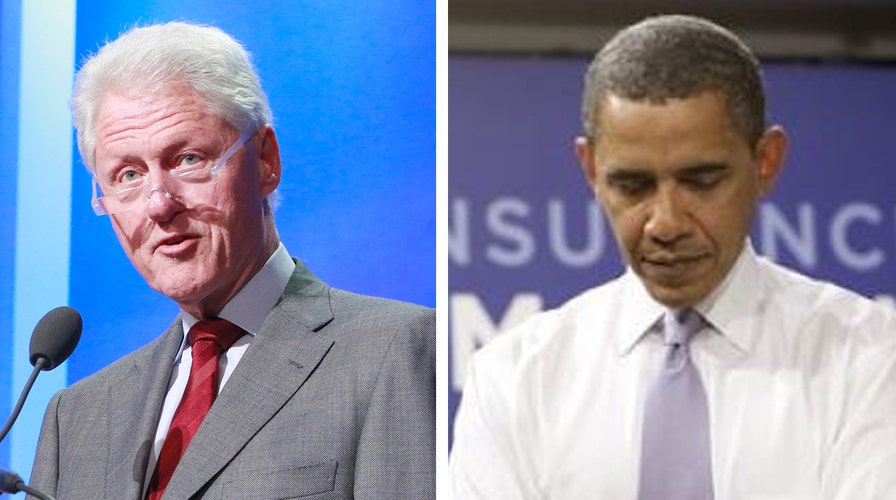Bill Clinton says ObamaCare doesn't work
The former president criticized Obama's healthcare system during speech
ObamaCare has survived dozens of Republican attempts to repeal and undermine it, but a new wave of Democratic complaints -- led most recently by former President Bill Clinton -- about the cost crush facing consumers is posing a fresh challenge.
Bill Clinton, on the campaign trail for Hillary Clinton, told voters in Michigan on Monday that the legislation has created a “crazy system” where millions more people have health care but those unable to qualify for subsidies are getting “killed.”
“The people … out there busting it, sometimes 60 hours a week, wind up with their premiums doubled and their coverage cut in half,” Clinton said. “It’s the craziest thing in the world.”
The comments come as Republican and Democratic administrations at the state level all grapple with fresh complications from the law, as insurers threaten to leave the ObamaCare exchanges amid financial concerns and customers face the prospect of rising premiums for the plans available.
Asked Tuesday about the Clinton comments, White House Press Secretary Josh Earnest said President Obama has “continued strong confidence” in the benefits provided under the health law.
“Twenty million Americans have access to quality affordable health insurance today that didn’t have it” before, he said. At the same time, Earnest said Obama acknowledges more can be done to “further strengthen the law” – and noted Hillary Clinton has signaled interest in doing so.
Amid the fallout from the ex-president’s remarks, Clinton spokesman Angel Urena clarified he was trying to speak about the “good it has done” in expanding coverage while addressing room for improvement.
“And while he was slightly short-handed, it's clear to everyone, including President Obama, that improvements are needed. That’s why Secretary Clinton has proposed measures including tax relief to cover excessive out-of-pocket costs, a public option and Medicare buy-in for those over 55,” Urena said.
In his remarks, Clinton also railed against the “insurance model” as a whole.
Clinton’s comments in Michigan follow officials in nearby Minnesota recently agreeing to huge price hikes in order to convince insurers to stay. Commerce Commissioner Mike Rothman announced Friday that individual market plans could raise rates as high as 67 percent next year. The jump in cost follows this year’s hike of 14 percent to 49 percent.
In a written statement, Rothman, who serves in a Democratic administration, said middle-class residents are getting “crushed” and called for urgent reforms in the state’s individual market.
“This year the need for reform is now without any doubt even more serious and urgent,” Rothman said. He called the soaring rates “unsustainable and unfair,” while saying the steps they took were necessary to “avert a collapse this year” – after the state’s largest health insurer, Blue Cross Blue Shield of Minnesota, announced it would stop selling health plans to individuals and families in 2017 and other insurers had threatened to follow.
#Obamacare Sticker Shock: A look at some of the largest approved premium hikes on individual market plans for 2017 pic.twitter.com/MGpynFTLMR
— Fox News Research (@FoxNewsResearch) October 4, 2016
The insurance giant said extraordinary financial losses drove its decision. The company said it was “projecting a total loss of more than $500 million in the individual [health plan] segment over three years.”
Many states are facing similar challenges.
“Employer markets are fairly stable, but the individual insurance market does not feel stable at all,” Janet S. Trautwein, chief executive of the National Association of Health Underwriters, told The New York Times. “In many states, the individual market is in shambles.”
Democrats, who once enthusiastically supported President Obama’s landmark legislation, are feeling the heat and looking for ways to cut consumer costs.
One Democrat-touted solution is the so-called public option.
Democratic presidential nominee Hillary Clinton, multiple members of Congress and even Obama himself are floating it as a cure for the growing crisis.
A public option -- or insurance plan offered by the government -- had been written into early versions of the bill but failed to make the final cut in the law signed by Obama in March 2010.
Thirty-three Democrats signed a non-binding Senate resolution last month to add the public option to ObamaCare.
Obama wrote recently in the Journal of the American Medical Association that “Congress should revisit a public plan to compete alongside private insurers in areas of the country where competition is limited.”
Oregon Democratic Sen. Jeff Merkley’s resolution isn’t likely to pass – since Republicans have a majority and generally oppose the idea as a way to fix ObamaCare.
Republican presidential nominee Donald Trump and several GOP lawmakers, including Sen. John McCain, of Arizona, argue the public option isn’t an option at all.
Arizona in particular is bracing for double-digit premium hikes next year. McCain, who has been a vocal opponent of ObamaCare from the start, maintains “the whole thing is collapsing like a house of cards.”
“Now that the law is unraveling, it’s no surprise that Democrats are clamoring for a so-called ‘public option,’” McCain recently told FoxNews.com in a statement. “If anything is clear about this failed law, it’s that more government intervention is the wrong solution to fixing our health care system.”
Cato Institute scholar Jeffrey Singer believes the public option is nothing more than a sleight of hand and “would eliminate competition, not increase it.”
“Few things are more frightening for the future of American health care,” he wrote. “ObamaCare’s critics were right to predict that it would enter a death spiral; Arizonans are now experiencing it firsthand. Now we must ensure that its death spiral doesn’t take us down an even darker road.”
Asked Tuesday about what might have been driving Bill Clinton’s critical comments, Donald Trump backer and ex-GOP primary rival Mike Huckabee said the former president is “telling it like it is.”
“The breaking news here is a Clinton is telling the truth,” Huckabee told Fox News. “And it’s kind of refreshing.”





